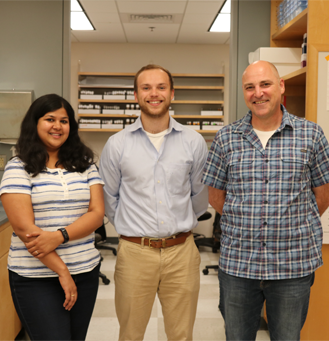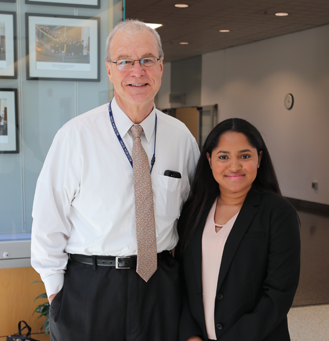Twenty-nine high-achieving college students from across the country wrapped up 10 enlightening weeks of mentored laboratory research. The members of the Combined Summer Undergraduate Research Opportunity Class of 2018 conducted biomedical research under the mentorship of UMMS faculty and lab members in an immersive and challenging hands-on experience that will help inform their career decisions as physicians, biomedical scientists or both.
 |
|
|
(from left) Neha Diwanji, Austin Peppers and Andreas Bergmann, PhD |
“It’s been a life-changing experience because being here and doing the research is so different from reading about it,” said Austin Peppers, a rising senior and allied health major with a pre-medical concentration at Bowling Green University. “You have to learn that things might not always go right, but when they do it’s awesome and that’s what makes it all worth it.”
The Summer Undergraduate Research Program participants learn together in classes and lectures and conduct experiments using state-of-the-art equipment and techniques in laboratories across campus. The program’s ultimate goal is to diversify the pool of biomedical researchers by providing structured research experiences to students, especially those from backgrounds which are economically or educationally disadvantaged or underrepresented in the field.
Peppers is working in the lab of Andreas Bergmann, PhD, professor of molecular, cell & cancer biology, under the direct supervision of fifth-year Graduate School of Biomedical Sciences student Neha Diwanji. As a summer program member, Peppers was assigned a project which, while challenging, could reasonably be completed within the 10-week timeframe. He’s been studying a cancer signaling pathway to contribute to Diwanji’s thesis research on apoptosis-induced proliferation.
Peppers said he was grateful to be in Dr. Bergmann’s cancer biology lab because he wants to make a difference in lung cancer research and treatment, as he is inspired by his late mother’s illness. He plans to attend medical school, take a gap year during medical training to conduct research, then decide whether to undertake a combined MD/PhD program.
“UMMS is high on my list after receiving such supportive mentorship and exposure to world class physicians and scientists,” he said.
 |
|
|
Terence Flotte, MD, and Dayana Frazer |
Similarly, University of New Orleans senior Dayana Frazer is now planning a gap year to work in a research lab before deciding on either an MD or MD/PhD program. “The technical aspects have been really interesting to me. You’re using what you learn for a purpose,” said Frazer, who was born in Honduras and came to the United States at age 12 to join her mother in New Orleans; both became citizens last year. “Getting this lab experience has opened me to wanting to learn more and do more research. I’m now interested in an MD/PhD program, or doing research as a physician to advance translational science.”
Frazer has learned how to do digestions, ELIZAs and transduction in order to optimize a protocol for lentiviral transduction using primary human T-cells in the gene therapy lab of Terence Flotte, MD, the Celia and Isaac Haidak Professor of Medical Education, executive deputy chancellor, provost and dean of the School of Medicine.
“I would definitely recommend the program—I loved it!” she said. “As a first-time researcher I learned so much and the people I was paired with were open to teaching me. Dr. Flotte has gone above and beyond to help me and open doors for me.”
On Thursday, Aug. 4, the undergraduate researchers showcased the fruits of their labor with judged poster presentations. The program closed on Friday, Aug. 5, with an awards ceremony for the best posters, and keynote speech from Deborah Harmon-Hines, PhD. Dr. Hines founded the Summer Undergraduate Research Program in 1993, running it and other outreach programs until her retirement in 2016 as professor emeritus of radiology. In her talk, she reflected on the stratospheric trajectory of scientific discovery in just the last three generations of humankind.
“What does this have to do with you?” Hines rhetorically asked the undergraduates, before answering for them. “There’s still a lot to do—and we expect you to do it! You are one of the best groups we’ve ever had, and you have all the tools you need.”
The Combined Summer Undergraduate Research Opportunity is co-led by Brian Lewis, PhD, associate professor of molecular, cell & cancer biology, and assistant vice provost for outreach and recruitment, and Pranoti Mandrekar, PhD, professor of medicine, with support from the National Institutes of Health; the UMass Medical School Office of the Provost; and the Exceptional Research Opportunities Program of the Howard Hughes Medical Institute. Learn more here.